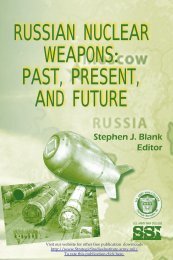The United States and China in Power Transition - Strategic Studies ...
The United States and China in Power Transition - Strategic Studies ...
The United States and China in Power Transition - Strategic Studies ...
You also want an ePaper? Increase the reach of your titles
YUMPU automatically turns print PDFs into web optimized ePapers that Google loves.
Japan is equally firm on this dispute. After all, Japan<br />
has had effective control of those isl<strong>and</strong>s for almost<br />
40 years now. (If <strong>Ch<strong>in</strong>a</strong> <strong>and</strong> Japan were to submit this<br />
dispute to the <strong>in</strong>ternational court, Japan would have<br />
an advantage simply because of its effective control<br />
of the disputed territory.) In October 2010, Secretary<br />
of State Cl<strong>in</strong>ton made clear that the U.S.-Japan mutual<br />
defense treaty is applicable to those isl<strong>and</strong>s. If <strong>Ch<strong>in</strong>a</strong><br />
were to use force to settle the issue, the <strong>United</strong> <strong>States</strong><br />
would come to Japan’s defense. <strong>Ch<strong>in</strong>a</strong> is certa<strong>in</strong>ly not<br />
happy with this U.S. <strong>in</strong>tervention. Yet it has to take<br />
this <strong>in</strong>to account. For the <strong>United</strong> <strong>States</strong>, s<strong>in</strong>ce it has<br />
<strong>in</strong>sisted that this dispute be settled <strong>in</strong> a peaceful way,<br />
the <strong>United</strong> <strong>States</strong> should st<strong>and</strong> firm on this position<br />
<strong>and</strong> prevent a war between <strong>Ch<strong>in</strong>a</strong> <strong>and</strong> Japan so that<br />
the <strong>United</strong> <strong>States</strong> does not have to fight either.<br />
On the Tibet <strong>and</strong> X<strong>in</strong>jiang Issues. <strong>Ch<strong>in</strong>a</strong>’s concern<br />
with the U.S. factor <strong>in</strong> the problems of these two regions<br />
is underst<strong>and</strong>able. However, <strong>Ch<strong>in</strong>a</strong> should pay<br />
more attention to its own policies <strong>and</strong> conduct <strong>in</strong> these<br />
two regions, for unlike the disputed territories <strong>in</strong> the<br />
Western Pacific, namely Taiwan <strong>and</strong> the isl<strong>and</strong>s <strong>in</strong> the<br />
East <strong>and</strong> South <strong>Ch<strong>in</strong>a</strong> Seas, <strong>Ch<strong>in</strong>a</strong> has effective control<br />
over Tibet <strong>and</strong> X<strong>in</strong>jiang. If <strong>Ch<strong>in</strong>a</strong> does it right, it can<br />
keep the Tibetans <strong>and</strong> Uyghurs happy <strong>in</strong> the Ch<strong>in</strong>ese<br />
union. <strong>The</strong>re is little the <strong>United</strong> <strong>States</strong> would do to<br />
underm<strong>in</strong>e <strong>Ch<strong>in</strong>a</strong>’s efforts. After all, the <strong>United</strong> <strong>States</strong><br />
has time <strong>and</strong> aga<strong>in</strong> stated that it does not challenge<br />
<strong>Ch<strong>in</strong>a</strong>’s sovereignty over these two regions. Its concern<br />
is mostly about human rights violations.<br />
It is good that <strong>Ch<strong>in</strong>a</strong> has the Develop<strong>in</strong>g the Western<br />
Region program go<strong>in</strong>g. It is fair to expect economic<br />
development to improve the overall situation<br />
<strong>in</strong> Tibet <strong>and</strong> X<strong>in</strong>jiang. However, as the noted Ch<strong>in</strong>ese<br />
dissident observer of Tibet <strong>and</strong> X<strong>in</strong>jiang affairs Wang<br />
Lixiong (王力雄) po<strong>in</strong>ts out, economic development is<br />
188

















